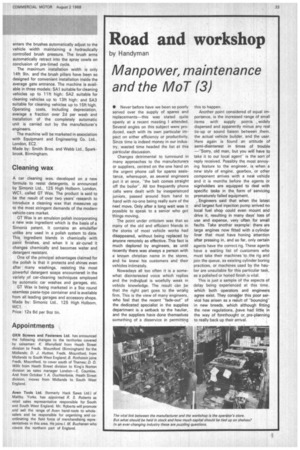Road and workshop
Page 35

If you've noticed an error in this article please click here to report it so we can fix it.
by Handyman
Manpower, maintenance
and the MoT (3)
• Never before have we been so poorly served over the supply of spares and replacements—this was stated quite openly at a recent meeting I attended. Several angles on this subject were produced, each with its own particular impact on either efficiency or productivity. Since time is indeed money in our industry, wasted time headed the list at this particular discussion.
Changes detrimental to turnround in many approaches to the manufacturers or suppliers, centred on the one hand on the urgent phone call for spares assistance, whereupon, as several engineers put it at once, "the belt comes straight off the boiler". All too frequently phone calls were dealt with by inexperienced Juniors, passed around from hand to hand with no-one being really sure of the next move. Only after a long wait was it passible to speak to a senior who got things moving.
The point under criticism was that so many of the old and efficient friends in the stores of most vehicle works had disappeared, without being replaced by anyone remotely as effective. This fact is much deplored by engineers, as until recently there was always a person with a known christian name in the stores, and he knew his customers and their vehicles intimately.
Nowadays all too often it is a somewhat disinterested voice which replies and the individual is woefully weak in vehicle knowledge. The result can be that the right part goes to the wrong firm. This is the view of many engineers, who feel that the recent "fade-out" of the dedicated specialist in the supplies department is a setback to the haulier, and the suppliers have done themselves something of a disservice in permitting this to happen.
Another point considered of equal importance, is the increased range of small items with supply points , widely dispersed and apparently minus any real tie-up or sound liaison between them, the actual vehicle builder, and the user. Here again is found an attitude of semi-disinterest in times of trouble —"Sorry, old man, but you will have to take it to our local agent" is the sort of reply received. Possibly the most annoying feature to the engineer, is when a new style of engine, gearbox, or other component arrives with a new vehicle and it is months before the agents or signholders are equipped to deal with specific tasks in the form of servicing prematurely failed equipment.
Engineers said that when the latest and largest fuel injection pump arrived no local fuel shop could even mount and drive it, resulting in many days' loss of use and expense, very often for small faults. Take another example: there are large engines now fitted with a cylinder liner that must have honing attention after pressing in, and so far, only certain agents have the correct rig. These agents have a waiting list of customers who must take their machines to the rig and join the queue, as existing cylinder boring practices, or machines used by the haulier are unsuitable for this particular task, as a polished or honed finish is vital.
This is just a sample of the aspects of delay being experienced at this time, which both operators and engineers agree exist. They consider this poor service has arisen as a result of "bouncing" in new breeds, which although fitting the new regulations, ;have had little in the way of forethought or. pre-planning to really back up their arrival.




































































































